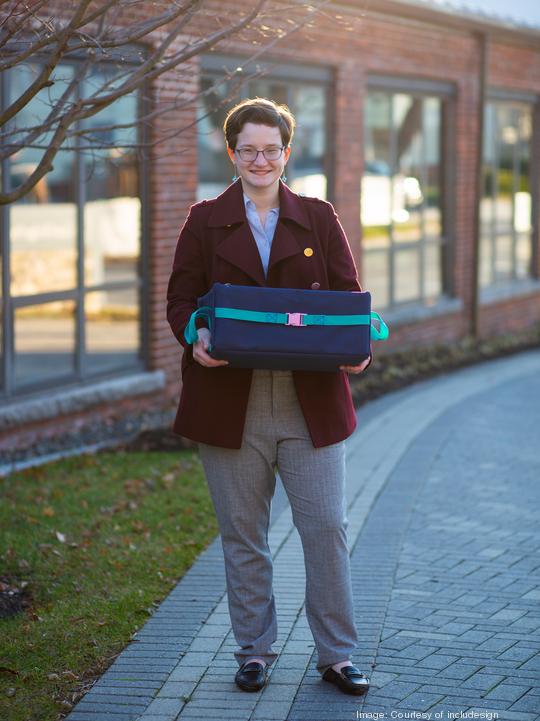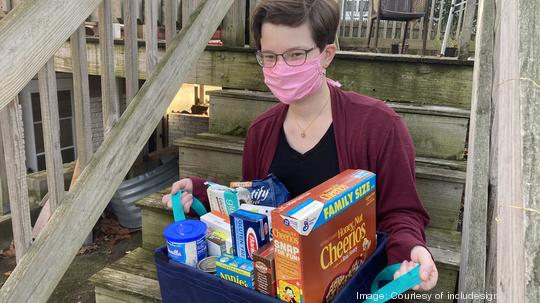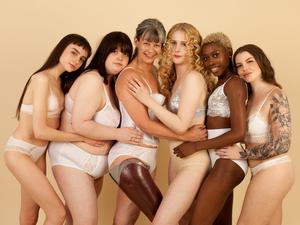
A lot of able-bodied people don’t realize just how difficult it can be for wheelchair users to complete a regular, everyday task like grocery shopping.
Grocery stores offer plastic hand baskets, but those are unstable and uncomfortable. There are also motorized shopping carts offered at grocery stores, but those require the wheelchair user to leave their own wheelchair, an expensive and personal piece of equipment, unattended while they shop.
To help make grocery shopping easier for wheelchair users, three recent Brown University graduates and their company, includesign, have created the LapSnap, a shopping basket designed with and for their target market.
The LapSnap is a 12.5-by-16.5-inch shopping basket designed with a fabric cover, a hard base and a layer of foam on the bottom, so the basket doesn’t leave nasty red marks or dig into a person’s legs. The product has a strap that can be attached behind the user’s back, under their leg or through the arm of the wheelchair. It’s also fully collapsible and can hold about a week’s worth of groceries.
“We wanted to make something that can be used by anyone, so we made it body-based instead of chair-based, so it doesn’t attach to your chair, it attaches to you,” said Diana Perkins, CEO of the startup. “The biggest thing we are trying to have as a center of our company is that we are designing products for disabled people, with disabled people.”
Perkins and includesign CFO Chloe Rosenberg came up with the concept while taking their senior engineering capstone class at Brown.
At first, the two considered making luggage for wheelchair users. But their professor, Sarah Skeels, who teaches in the public health department at Brown and is also a wheelchair user, said that isn't much of an issue for her — what is really an issue is grocery shopping.
The team began to work with Skeels and some of her friends to design a shopping basket they would test and refine with feedback from wheelchair users. Perkins and Rosenberg brought on COO Hannah Mintz and eventually created the first LapSnap prototype from scratch after learning to sew. The team has been working full time on the product since last February.

While the coronavirus pandemic has slowed development, includesign has been mailing LapSnaps to wheelchair users for testing and receiving valuable feedback. The company plans to launch a Kickstarter campaign in or around February to bring in pre-orders and raise money to manufacture the first batch.
Ultimately, Perkins sees the LapSnap as the first of many products includesign will create for people with disabilities. She said the team is already thinking about designing a smaller version of the LapSnap for children or people who use walkers.
Perkins said she thinks it’s important for includesign to always work closely with wheelchair users or people with disabilities when designing products to avoid a trap that a lot of able-bodied designers fall into. She notes that people with disabilities are often overlooked by able-bodied product designers, architects, fashion designers and more.
“If you work in isolation and don’t talk to the people you are designing for until you have a finished prototype, you are going to miss the real problems,” she said.
The startup is entering a fast-growing market — one that by some estimates could reach nearly $36 billion in the next five years. That’s all the more reason Perkins wants to ensure she and her team get product design right from the beginning.
“If we are designing products for [people with disabilities], then they should be the ones making most of the decisions and having the greatest impacts on the products,” Perkins said. “We don't want to be a company that creates a product for able-bodied people and then talks to disabled people and says, ‘O.K., how can we make this work for you.’ We want to be a company that makes products for individuals with disabilities first, foremost and only.”
includesign is one of Rhode Island Inno’s Startups to Watch in 2021. Check out the complete list here.
Bram Berkowitz is a contributing writer for Rhode Island Inno.






